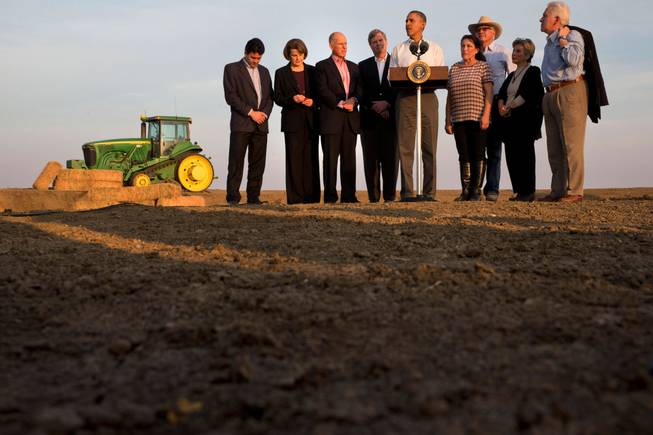
Jacquelyn Martin / AP
President Barack Obama, center, speaks about the drought after touring a local farm in Los Banos, Calif., Friday, Feb. 14, 2014, as from left, Michael Connor, commissioner of bureau of reclamation Sen. Dianne Feinstein, D-Calif., Calif. Gov. Jerry Brown, Agriculture Secretary Tom Vilsack, Obama, Maria Gloria Del Bosque of Empresas Del Bosque, Inc., Joe Del Bosque of Empresas Del Bosque, Inc., Sen. Barbara Boxer, D-Calif., and Rep. Jim Costa, D-Calif., listen.
Friday, Feb. 14, 2014 | 9:29 p.m.
LOS BANOS, Calif. — Warning that weather-related disasters will only get worse, President Barack Obama said Friday the U.S. must rethink the way it uses water as he announced new federal aid to help drought-stricken California.
Obama drew a clear connection between California's troubles and climate change as he toured part of a farm that will go unsown this year as the state faces its worst drought in more than 100 years. Even if the U.S. takes action now to curb pollution, the planet will keep getting warmer "for a long time to come" thanks to greenhouse gases that have already built up, Obama said.
"We're going to have to stop looking at these disasters as something to wait for. We're going to have to start looking at these disasters as something to prepare for," Obama said.
After arriving in California on Friday afternoon, Obama met with community leaders at a rural water facility before announcing more than $160 million in federal financial aid, including $100 million in the farm bill he signed into law last week for programs that cover the loss of livestock.
The overall package includes smaller amounts to aid in the most extreme drought areas and to help food banks that serve families affected by the water shortage. Obama also called on federal facilities in California to limit water consumption immediately.
"These actions will help, but they're just the first step," he said. "We have to be clear. A changing climate means that weather-related disasters like droughts, wildfires, storms, floods, are potentially going to be costlier and they're going to be harsher."
He urged Congress to act swiftly on Democratic legislation backed by California's senators, Dianne Feinstein and Barbara Boxer, that would pour $300 million into emergency aid and drought-relief projects, upgrade city water systems and water conservation, and speed up environmental reviews of water projects, among other steps.
The president also announced that the budget he'll send to Congress next month will include $1 billion for a proposed "climate resilience fund" to invest in research and pay for new technologies to help communities deal with the impact of climate change. The proposal is likely to face stiff resistance from lawmakers wary of new spending and divided on the subject of global warming.
Later Friday, Obama was meeting Jordan's King Abdullah II at the Rancho Mirage estate Sunnylands for talks covering the Mideast peace process, Syria and other issues. It's unusual for Obama to host world leaders outside of the White House, though he did hold a two-day summit at Sunnylands last year with Chinese President Xi Jinping.
Obama planned to spend Presidents Day weekend at the estate and was expected to make use of its golf course. He traveled without first lady Michelle Obama.
The White House has been closely watching the California drought, which follows a year of the lowest rainfall on record. The drought has also brought to a head political warfare over the state's water resources that feed major cities, the country's richest agricultural region and waterways that provide habitat for endangered species of fish.
No longer can the U.S. afford to think about water as a competition between the nation's agricultural and urban areas, Obama said earlier at a water facility in Firebaugh. With overall water resources expected to diminish significantly in the future, he said, the country must find better ways to cooperate.
"We are going to stay on top of this because it has national implications," Obama said.
Farmers recently learned they will not be receiving irrigation water from the State Water Project, a system of rivers, canals and reservoirs. They anticipate a similar announcement later this month from federal authorities who operate a similar system called the Central Valley Project.
Federal officials, including Agriculture Secretary Tom Vilsack, earlier this month pledged $34 million to help farmers and ranchers conserve scarce water supplies, improve irrigation methods, head off erosion of unplanted fields and create better ways to water livestock.
The Republican-controlled House recently voted to address the drought by rolling back environmental protections and temporarily halting the restoration of a dried-up stretch of the San Joaquin River, work that is designed to restore historic salmon runs. Farmers would prefer to have the water diverted to their crops instead.
Environmentalists and Democrats oppose the bill, and the White House has threatened a veto, arguing that the measure would not alleviate the drought but would undo decades of work to address California's longstanding water shortages.

Join the Discussion:
Check this out for a full explanation of our conversion to the LiveFyre commenting system and instructions on how to sign up for an account.
Full comments policy